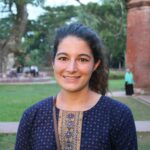Migrating in Climates
 Meet Kelsea Best, a 2021-2022 RPW Center Environments Graduate Student Fellow. She is a PhD Candidate in the Department of Earth and Environmental Sciences, and her dissertation is entitled “Dynamics of Changing Landscapes, Livelihoods, and Migration in Bangladesh.”
Meet Kelsea Best, a 2021-2022 RPW Center Environments Graduate Student Fellow. She is a PhD Candidate in the Department of Earth and Environmental Sciences, and her dissertation is entitled “Dynamics of Changing Landscapes, Livelihoods, and Migration in Bangladesh.”
What is your research about and why does it matter?
Climate change is one of the most urgent challenges of our time. It is poised to disrupt all aspects of society, with serious implications for justice, equity, and sustainable development. My research aims to understand how climate change interacts with human societies, how people may adapt to climate impacts, and how climate adaptation measures can be designed and implemented in a just and equitable way.
Because of the complexity of climate and society interactions, my research is highly interdisciplinary, and I strive to connect methods, disciplines, and researchers from across geographies and fields. To do so, I collaborate with social and environmental scientists and use a variety of data-driven methods, including machine learning and agent-based modeling as the foundations of my current and future research.
My work spans geographies, as climate change impacts all parts of the world. I use machine-learning and agent-based modeling to investigate how environmental stress and climate change interact with human migration decisions in coastal Bangladesh. I am also interested in how climate change compounds housing and social vulnerability in coastal U.S. cities, which I study by applying machine learning to questions of climate gentrification.
Finally, I am interested in challenging conceptions of data justice and ensuring that my work elevates the voices of the most vulnerable. To this extent, I am exploring the role of narrative and community participation in informing computational models.
Describe a discovery or a moment in your research that excited you.
As someone who works primarily with computational methods and data analytics, I am interested in new ways to incorporate different kinds of data into my research in a way that elevates the voices of the most vulnerable people who are impacted by my research. To begin to pursue this goal, I received funding from the Vanderbilt Curb Center for Art and Public Policy to collect and curate narratives from environmental migrants currently living in the Korail informal community in Dhaka, Bangladesh. By working with a colleague in Bangladesh, I have been able to collect the stories of these migrants, which provide a uniquely rich dataset that provides insights into the embodied nature of migration, the emotions involved, and the lived experiences of real migrants.
These narratives have already informed my agent-based modeling of migration and have provided me with a much deeper, more personal understanding of the experiences of environmental migrants. Hearing the stories of the migrants has been one of the most exciting, enriching experiences of my research. Similarly, I have had the opportunity to travel to Bangladesh twice during my PhD experience and each trip has provided me with invaluable experiences of the place that I study, including a more profound understanding of the setting, people, and culture.
What was your first job and what did you learn from it?
My first ever job was as a tennis coach for a summer program for elementary age children. I think it provided me with a much deeper appreciation for teachers and coaches! I was exhausted after every day!
Kelsea Best is a fifth year PhD candidate in Earth and Environmental Sciences at Vanderbilt University. Her dissertation work focuses on using quantitative methods including machine learning and agent-based modeling to study environmental and climate migration in coastal Bangladesh. She is also the PI of a Graduate Pursuit through the National Socio-Environmental Synthesis Center (SESYNC) which uses machine learning to study climate gentrification along the east coast of the United States. Broadly, she is interested in coupled human-natural systems, climate adaptation, and climate justice.